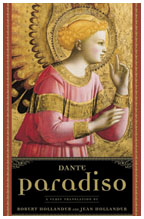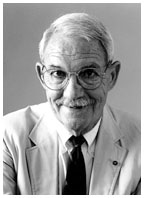September 26, 2007: Books and Arts
Translating heaven
Robert Hollander ’55 finishes Dante’s masterpiece
Examining interracial tensions
David Lamb *92’s play strikes a personal chord
For a complete list of books received, click here.
An abundance of notes by Robert Hollander ’55 helps readers navigate Dante’s “Paradiso.” (Courtesy Random House) |
ReadingRoom
Translating heaven
Robert Hollander ’55 finishes Dante’s masterpiece
By David Marcus ’92
A new edition of Dante’s Paradiso doesn’t just crown Robert Hollander ’55’s long study of the Italian poet; it also marks his recovery from a severe illness.
Hollander and his wife, Jean, a poet and writing teacher at the College of New Jersey, had published the first two volumes of Dante’s The Divine Comedy, and Jean had prepared a draft of Paradiso, when Hollander suffered a stroke in 2004. He spent most of the next seven months in a hospital or a rehabilitation institution. At first he was unable to use his right leg and arm; even watching TV and reading were difficult because he could not concentrate.
 Hollander
thought of his longtime friend Robert Fagles, a fellow comparative literature
professor emeritus at Princeton, who had become seriously ill while he
was working on a translation of Virgil’s epic poem, The Aeneid.
Hollander wondered whether Fagles would finish The Aeneid —
Fagles did, publishing his book last year — and whether he would
finish Paradiso. Slowly, Hollander regained the use of his left
side and began reading again. Writing came more slowly, but he eventually
began working on the commentary of Paradiso.
Hollander
thought of his longtime friend Robert Fagles, a fellow comparative literature
professor emeritus at Princeton, who had become seriously ill while he
was working on a translation of Virgil’s epic poem, The Aeneid.
Hollander wondered whether Fagles would finish The Aeneid —
Fagles did, publishing his book last year — and whether he would
finish Paradiso. Slowly, Hollander regained the use of his left
side and began reading again. Writing came more slowly, but he eventually
began working on the commentary of Paradiso.
Last month, Doubleday published Hollander’s translation and commentary of Paradiso, the final part of The Divine Comedy, in which Dante details his imaginary trip through hell, purgatory, and heaven. Inferno details the brutal, bizarre punishments those damned by God must endure: Some especially treacherous characters are frozen in contorted positions in ice forever, for example. Purgatorio describes the challenges God sets for the dead to cleanse themselves of sin, while in Paradiso, Dante, led by the angel Beatrice, ascends to the highest reaches of heaven, which, like hell and purgatory before it, is rigorously structured with multiple levels. Dante describes his vision of a heaven animated by “the love that moves the sun and the other stars,” as he describes God in the poem’s final words. With an initial print run of 15,000 — a relatively large number for an academic title — Paradiso is expected to garner a good following, attracting students and Dante enthusiasts alike.
Paradiso’s abstract language and heavy emphasis on theology make it the most daunting of the three works. Hollander believes it’s also the best. “Dante knows he’s testing his reader,” Hollander says. “He’s playing a very dangerous game, because he’s taking on all his predecessors,” by, for example, recasting metaphors from The Aeneid, Dante’s favorite pagan text, and reworking the abstruse medieval theology of Thomas Aquinas into dazzling poetry.
That complexity explains the profusion of notes Hollander wrote for his edition. His wife and his editor pared down his notes on Inferno, but he prevailed this time. “Paradiso just requires more,” he says. Hollander spent two years annotating the text. He’d go into his office in Firestone Library once a week, review his detailed files on each canto, take notes on his computer, and then work on the file at home, making liberal use of the Princeton Dante Project (www.princeton. edu/dante), which he helped design in the late 1990s; it includes Italian text of The Divine Comedy, an English translation, historical and interpretive notes, recitation of the poem in Italian, and links to other Dante Web sites.
The notes in Paradiso give the reader a sense not only of Dante’s
intellectual world, but of Hollander’s passionate engagement with
the poem, an enthusiasm so infectious that alumni of his course on The
Divine Comedy have for years gathered to discuss a selected canto
on the Friday afternoon of Reunions. Hollander writes his notes with the
same zeal, praising and criticizing other critics, offering his interpretations
of difficult passages, and on occasion citing a particularly astute reading
by one of his students. It’s as if the reader is in the same room
as Hollander, who says his “job in life is to get people interested
in Dante.” ![]()
David Marcus ’92 is a frequent PAW contributor.
MORE ON THE WEB: Readings of the final canto of “Paradiso” by Robert Hollander in English and Roberto Benigni in Italian, click here.
For a complete list of books received, click here.
 The Zen of Fish:
The Story of Sushi, From Samurai to Supermarket — Trevor
Corson ’91 (HarperCollins). In this account of the making of a sushi
chef, the author follows a young American woman through her training in
Los Angeles. Woven throughout the narrative is the natural history of
the fish and rice, as well as the origins of the meal and its emergence
as an international cuisine. Corson also wrote The Secret Life of Lobsters.
The Zen of Fish:
The Story of Sushi, From Samurai to Supermarket — Trevor
Corson ’91 (HarperCollins). In this account of the making of a sushi
chef, the author follows a young American woman through her training in
Los Angeles. Woven throughout the narrative is the natural history of
the fish and rice, as well as the origins of the meal and its emergence
as an international cuisine. Corson also wrote The Secret Life of Lobsters.
 The Wild Trees:
A Story of Passion and Daring — Richard Preston *83 (Random
House). The author takes readers to the tops of the world’s tallest
trees, the redwoods of northern California, more than 300 feet high. He
follows botanists Steve Sillett and Marie Antoine and a small group of
other daring botanists and amateur naturalists who study the ecosystem
of the trees’ canopies, which until the 1980s largely had been unexplored.
Preston writes for The New Yorker.
The Wild Trees:
A Story of Passion and Daring — Richard Preston *83 (Random
House). The author takes readers to the tops of the world’s tallest
trees, the redwoods of northern California, more than 300 feet high. He
follows botanists Steve Sillett and Marie Antoine and a small group of
other daring botanists and amateur naturalists who study the ecosystem
of the trees’ canopies, which until the 1980s largely had been unexplored.
Preston writes for The New Yorker.
 Uncommon
Arrangements: Seven Portraits of Married Life in London Literary Circles,
1910–1939 — Katie Roiphe *95 (Dial Press). Drawing
on memoirs, personal correspondence, and journals, the author examines
the unorthodox relationships of seven couples, including H.G. Wells and
his wife, Jane, and feminist writer Vera Brittain and George Catlin. Each
chapter, which covers one of the seven couples, focuses on a crisis that
occurred in a union and how it was resolved or not. Roiphe is also the
author of The Morning After.
Uncommon
Arrangements: Seven Portraits of Married Life in London Literary Circles,
1910–1939 — Katie Roiphe *95 (Dial Press). Drawing
on memoirs, personal correspondence, and journals, the author examines
the unorthodox relationships of seven couples, including H.G. Wells and
his wife, Jane, and feminist writer Vera Brittain and George Catlin. Each
chapter, which covers one of the seven couples, focuses on a crisis that
occurred in a union and how it was resolved or not. Roiphe is also the
author of The Morning After.
 Animal Architects:
Building and the Evolution of Intelligence — James L. Gould
and Carol Grant Gould. The authors explore the workings of animals’
minds by studying the structures they build. They examine species whose
blueprints are largely innate, such as spiders, and those whose structures
seem to require intellectual insight and planning, such as beavers’
dams. James L. Gould is a professor of ecology and evolutionary biology
at Princeton. Carol Grant Gould, his wife, is a science writer.
Animal Architects:
Building and the Evolution of Intelligence — James L. Gould
and Carol Grant Gould. The authors explore the workings of animals’
minds by studying the structures they build. They examine species whose
blueprints are largely innate, such as spiders, and those whose structures
seem to require intellectual insight and planning, such as beavers’
dams. James L. Gould is a professor of ecology and evolutionary biology
at Princeton. Carol Grant Gould, his wife, is a science writer. ![]()
By K.F.G.
For a complete list of books received, click here.
Lawyer-turned-playwright David Lamb *92, right, infuses his plays with hip-hop, poetry, romance, and politics. Above, cast members recite the closing poem of “Platanos and Collard Greens.” (photos courtesy David Lamb *92) |
Examining
interracial tensions
David Lamb *92’s play strikes a personal chord
Playwright David Lamb *92 quietly waited in the lobby of the Florence Gould Hall, an off-Broadway theater on the Upper East Side of Manhattan, as another sold-out crowd gathered for his play, Platanos and Collard Greens, on a summer afternoon in July.
The audience, largely African-American and Latino, laughed loud and hard at the romantic comedy about two students at Hunter College: Freeman, an African-American, and Angelita, a Dominican whose mother tries to break up the young couple. The characters goof around with dating rituals and thoughts on “good hair.” Lamb has written an explosively funny play about the relationship between African-Americans and Latinos that has struck a personal chord with audiences. Infused with hip-hop and poetry, Platanos and Collard Greens, Lamb’s first play, explores the tensions between African-Americans and Dominicans and, says Lamb, the need to set aside their differences and stereotypes and participate in a political system that often does not represent their interests.
Lamb, who is African-American and grew up in a housing project in New York before attending Hunter College, was motivated to write the play because he noticed that some Dominicans denied their African heritage. “They had a different relationship to their African heritage than African-Americans did,” he said. A college internship with then-New York state assemblyman from the South Bronx (and now congressman) José E. Serrano piqued Lamb’s interest in black and Latino politics and encouraged Lamb to see that if African-Americans and Latinos work together they might be able to get candidates sympathetic to their views elected.
In the play, Angelita’s mother subverts the young couple’s love because she does not want her lighter-skinned daughter mixing with darker African-Americans. She has told her daughter to “stay out of the sun so you don’t look like those Haitians.” Latinos, says Freeman in the play, “try to pass for anything other than being of African descent.”
Platanos and Collard Greens started as a novel, Do Platanos Go Wit’ Collard Greens?, that Lamb self-published in 1994. The book led to speaking engagements at colleges. Some of the students he met with urged him to turn it into a play “because they were so struck at how accurately it captured their lives,” said Lamb, 40, who earned an M.P.A. from the Woodrow Wilson School and a law degree from New York University.
Lamb and his wife, Jamillah, a former banker, invested $20,000 to get the play off the ground, hiring Lamb’s former WWS roommate, Sevin Akbar *88 (aka Summer Hill Seven), as the director.
Platanos and Collard Greens premiered in 2003 in a 70-seat theater and today sells out nearly every performance in the 400-seat Florence Gould Hall. News of the play has spread largely through word of mouth, said Lamb. The play has an open-ended run. About 50,000 people have seen the play in New York theaters; another 50,000 college students have seen it as it tours campuses, including Princeton’s, where it was presented several years ago and might stop again this year.
A lawyer at a Wall Street law firm at the time he wrote his novel, Lamb later worked for the Low-Income Investment Fund, a community-development financial institution that works on creating affordable housing in New York City, before turning to playwriting fulltime four years ago.
Audience members connect on a personal level with the play’s themes, said Lamb. After one performance, he said, a Dominican mother who had come at her daughter’s urging was almost in tears because she recognized herself in the character of Angelita’s mother. “She didn’t like what she saw,” said Lamb.
Next up for Lamb is From Auction Block to Hip-Hop, a satire focusing on the selling of negative stereotypes of black, Latina, and Asian women in the hip-hop music industry, which previewed at the Florence Gould Hall in New York in August and will premiere next winter or spring. (Akbar is the director.) That play, like his first, uses humor to get his ideas across. Borrowing a quote from George Bernard Shaw, Lamb said, “If you are going to tell people the truth, you better make them laugh.”By K.F.G.



